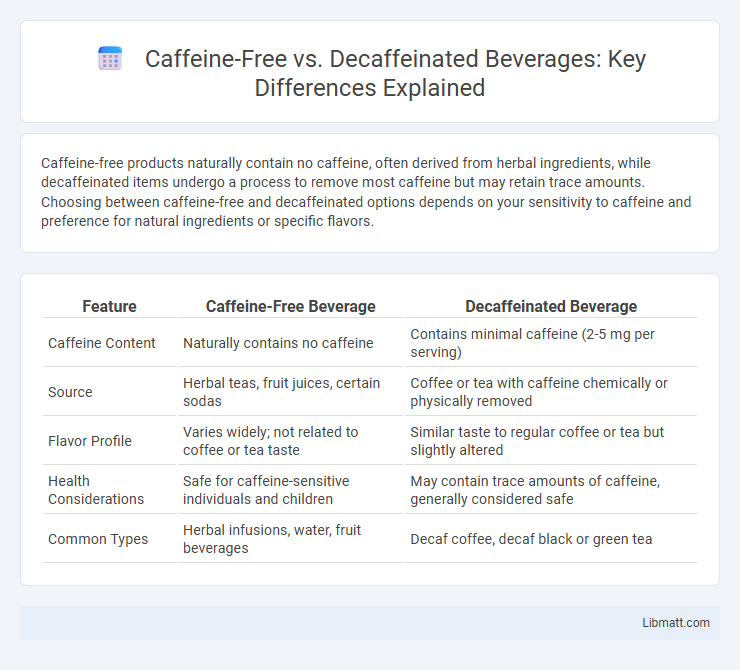Caffeine-free products naturally contain no caffeine, often derived from herbal ingredients, while decaffeinated items undergo a process to remove most caffeine but may retain trace amounts. Choosing between caffeine-free and decaffeinated options depends on your sensitivity to caffeine and preference for natural ingredients or specific flavors.
Table of Comparison
| Feature | Caffeine-Free Beverage | Decaffeinated Beverage |
|---|---|---|
| Caffeine Content | Naturally contains no caffeine | Contains minimal caffeine (2-5 mg per serving) |
| Source | Herbal teas, fruit juices, certain sodas | Coffee or tea with caffeine chemically or physically removed |
| Flavor Profile | Varies widely; not related to coffee or tea taste | Similar taste to regular coffee or tea but slightly altered |
| Health Considerations | Safe for caffeine-sensitive individuals and children | May contain trace amounts of caffeine, generally considered safe |
| Common Types | Herbal infusions, water, fruit beverages | Decaf coffee, decaf black or green tea |
Understanding Caffeine-Free vs Decaffeinated
Caffeine-free beverages contain no caffeine naturally or have been produced without any caffeine content, making them ideal for those avoiding caffeine completely. Decaffeinated products, however, still contain trace amounts of caffeine, usually less than 3%, because the decaffeination process cannot remove caffeine entirely. Understanding this distinction helps you choose the best option for your health needs or sensitivity to caffeine.
How Caffeine Is Removed: Methods Explained
Caffeine is removed from coffee beans using several primary methods, including the Swiss Water Process, which relies on water and osmosis to extract caffeine without chemicals. Another common technique is the use of solvents such as methylene chloride or ethyl acetate, which selectively dissolve caffeine molecules while preserving flavor compounds. Carbon dioxide extraction is a modern method that uses supercritical CO2 to target caffeine, offering a chemical-free alternative that maintains the coffee's original taste profile.
Natural Sources of Caffeine-Free Beverages
Herbal teas such as chamomile, rooibos, and peppermint are natural caffeine-free beverages derived from plants that do not contain caffeine. Fruit infusions and water-based drinks like coconut water also offer caffeine-free hydration options naturally. These alternatives provide the benefit of being free from synthetic processes often used in decaffeination.
Health Benefits of Going Caffeine-Free
Choosing caffeine-free beverages instead of decaffeinated options significantly reduces your caffeine intake, which can improve sleep quality, reduce anxiety, and lower blood pressure. Caffeine-free products eliminate the risk of caffeine dependence and withdrawal symptoms, promoting overall cardiovascular health and better digestion. Your body may also benefit from fewer acid reflux episodes and enhanced hydration when switching to completely caffeine-free drinks.
Decaffeinated Options: What’s Available?
Decaffeinated options include a variety of coffee and tea products with significantly reduced caffeine content, typically containing 2-5 mg of caffeine per cup compared to regular coffee's 95 mg. Methods like Swiss Water Process, CO2 extraction, and chemical solvents are used to remove caffeine while preserving flavor in decaf coffee. Herbal teas, rooibos, and chamomile represent naturally caffeine-free alternatives, offering diverse flavors without the stimulant effects.
Taste Differences: Caffeine-Free vs Decaf
Caffeine-free beverages, often made from herbal ingredients, tend to have a naturally varied flavor profile that differs significantly from roasted coffee or tea notes found in decaffeinated options. Decaffeinated coffee retains much of the original coffee's rich and robust taste, though some subtle bitterness may be reduced during the decaffeination process. Your choice between caffeine-free and decaf depends on whether you prioritize a completely caffeine-free experience with distinct herbal flavors or prefer a closer resemblance to traditional coffee taste.
Caffeine Sensitivity: Who Should Avoid It?
Individuals with high caffeine sensitivity or certain medical conditions such as anxiety disorders, heart arrhythmias, or pregnancy should avoid caffeinated beverages due to potential adverse effects like jitteriness or increased heart rate. Caffeine-free products, naturally devoid of caffeine, offer a safe alternative for these individuals, while decaffeinated beverages still contain trace caffeine amounts and may not be suitable for extreme sensitivity cases. Consumers seeking to minimize caffeine intake must distinguish between caffeine-free and decaffeinated options to effectively manage symptoms related to caffeine sensitivity.
Labeling Laws: Decaf and Caffeine-Free Products
Labeling laws for decaffeinated and caffeine-free products vary by country but typically require clear disclosure of caffeine content to protect consumer awareness. Decaf products must contain substantially reduced caffeine, often less than 0.1% caffeine by weight, while caffeine-free products are expected to have no caffeine at all. You should check labels carefully to distinguish between these options and ensure compliance with local regulations when choosing a product.
Common Myths About Decaf and Caffeine-Free
Decaffeinated coffee often faces myths suggesting it contains no caffeine, but it typically retains about 2-5 mg per cup, unlike truly caffeine-free herbal teas or beverages. Some believe decaf is chemically altered or unhealthy, though modern processes effectively remove caffeine without compromising safety or flavor. Understanding these distinctions helps you make informed choices about your caffeine intake based on actual content, not misconceptions.
Making the Best Choice: Personalized Recommendations
Choosing between caffeine-free and decaffeinated options depends on your sensitivity to caffeine and health goals. Caffeine-free beverages completely eliminate caffeine, making them ideal for those avoiding stimulants, while decaffeinated products contain minimal residual caffeine but retain more flavor and antioxidants. Assessing your lifestyle needs and taste preferences ensures the best personalized choice for your daily routine.
Caffeine-free vs decaffeinated Infographic

 libmatt.com
libmatt.com